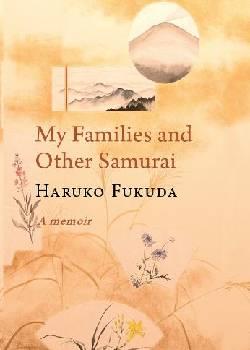My Families and Other Samurai: A Memoir

By Fukuda Haruko
Richfield and Barr Publishing Limited (2023)
ISBN-13: 978-1399959056
Review by Laurence Green
UK-based financier Fukuda Haruko will be familiar to many members of The Japan Society, not only as a former Joint Chair of the Society herself, but for her long and successful career in the cut and thrust world of finance, working as both a stockbroker and investment banker in the City of London.
Forging a distinctly international career that traces its roots back to a time when the process of reconciliation between Japan and the rest of the world was very much still a work in progress, Fukuda’s story is clearly fertile ground for a memoir. But what makes My Families and Other Samurai such a compelling volume is that for every bit it is a story of her own life, it is also a testament to the lives of her parents Masaru and Yoko - their story bound up in an intricate, interconnected web of individuals moving in the very upper echelons of wealth and influence in 20th century Japan. What emerges is a glimmering portrait of socio-political history in which Fukuda’s family and their forebears on both sides emerge as key players involved on the frontlines of not only the country’s emergence as a modern nation, but also characters uniquely positioned to capture the flavour of the Japanese upper classes’ way of life, something rarely documented so accessibly and candidly for Anglophone audiences before.
The book’s early passengers extend out in broad fashion, detailing a complex dynastic structure of arranged marriages, samurai families and entrepreneurial ‘new money’ forged in the heat of Japan’s Meiji Restoration. Fukuda’s ancestors and extended family include Tanaka Heihachi - the legendary founding father of Japan’s foreign exchange market - and Yamanashi Katsunoshin - a highly influential Admiral who would go on to become President of the very same Peers’ school where Fukuda herself, as well as members of the Japanese Imperial Family, were educated.
There is ample detail too on the family residence Fukidecho, which occupied the plot of land immediately south of Tokyo’s esteemed Hotel Okura. The moving descriptions of this home, along with the many photographs included in the book, offer a wistful ode to the ceaseless march of time; the property eventually sold off and redeveloped bit by bit until - as is perhaps not a surprise to anyone that knows the nature of the Tokyo property market - the site is utterly unrecognisable in its present day form.
What follows is the heart of the book’s premise - Fukuda’s parents Masaru and Yoko, and their lives pre, during and post the Second World War. Even for a family in the elite of Japanese society, the years of Occupation following the war were not without their hardships, though what emerges as the most engrossing part of the tale is the family’s ceaseless relocation - first to Washington, then London - as Masaru rises through the ranks of Japan’s Ministry of Finance.
The life of a diplomatic family, bound as it is to ‘service’, is portrayed with elegance and verve in these chapters - we hear of Fukuda’s invitation to the Kennedy White House during the family’s time in the States - but we are also afforded the fine detail of Masaru’s accomplishments in his involvement with the Japanese Government Sterling Bond Issue of 1963, an international first. As Fukuda points out - the surface level glamour of the diplomatic life; endless diners, members clubs and shopping at the finest stores, always carried with it the double-edged sword of unceasing hard work.
Fukuda’s own time in the UK also holds immense interest; schooled at Channing, and then her ‘going up’ to read history at Cambridge’s New Hall. One wonders what it must have been like to be a Japanese in London in the 60s, still only a couple of decades after the War, and a woman at that - to then reach this bastion of British higher education. Fukuda’s memories capture this with laser-like detail, and also grapple with the complex intensity of feelings as she ponders to what degree she feels removed from the country of her birth the longer she spends abroad.
The book’s emotional and narrative climax comes, as it inevitably must, with Masaru’s death in 1984. We are given a moving insight into his final wishes for Fukuda to help disseminate his collected economic writings to long-time friends and acquaintances, and also the meticulous detail by which he planned his own funeral. These pages lead into the book’s elegiac finale, which necessarily speeds through the 80s and 90s (further details of Fukuda’s own career during these times are promised in what will no doubt be an engrossing subsequent volume) to tell us of Yoko’s time during widowhood, and the poignancy of her 100th birthday - which having happened during the COVID pandemic, is carried out via Zoom.
The reader is ultimately left with an engrossing family portrait that arguably does for 20th century Japan what the likes of Hugo Vickers and Simon Heffer have done for the aristocracy and political elite of Britain during the same period. Told with the crisp, breezy matter-of-factness of a historian, the emotion nevertheless comes through strongest in the remarkable vividity in which Fukuda’s parents are conveyed in the text. We feel their lives through their habits, their interests - but more than this, we feel their stoicism and unshakeable sense of service to both family and nation. This is, undoubtedly, the essence of the samurai conveyed in the book’s title, but also, perhaps, a valiant attempt at getting to the very heart of the human condition itself, and the meaning we all, ultimately, aim to glean from the years allotted to us.

